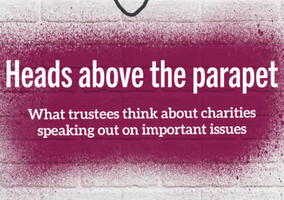Charities need to be aware of the new Non-Party Campaigner Code which comes into effect from 1 December, the chair of the Charity Commission has advised.
Orlando Fraser, chair of the charity regulator, and John Pullinger chair of the Electoral Commission, wrote in a blog that charities “need to know” what this will mean for the charity sector.
“By way of summary, in addition to a charity’s continuing obligations under normal charity law, electoral law requires charities to register as non-party campaigners if they spend over a certain amount on regulated campaign activities in the 12 months leading up to the next election,” the blog states.
It adds that spending on certain activities is regulated if the activity can reasonably be regarded as intended to influence people’s voting choice.
“Thus, such activity, which is lawful under charity law if it isn’t supporting a specified party or candidate, is regulated under electoral law, counting towards your spending limit,” the blog reads.
“You will be required to register with the Electoral Commission as non-party campaigners if your charity spends over £10,000 (previously this was over £20,000 in England), on regulated campaign activities, across the UK. After the election, you may then need to provide financial returns to support public transparency,” it adds.
The third thing the blog highlights is that the law now requires an imprint to be included on digital material that falls within the definition of regulated campaign activities.
The blog states: “An imprint tells voters who is responsible for publishing and promoting campaign material. This means that many types of digital material such as social media adverts and posts will require an imprint.”
‘Charities can take part in political activity’
The blog adds that the organisations understand many charity leaders and trustees will see this as a critical moment to speak up for beneficiaries and highlight causes.
“Charities have a proud record of engaging in public debate and campaigning on behalf of their purposes which is entirely legitimate” and doing so consistently with the legal framework is crucial.
“Charities can take part in political activity provided it supports their purpose and is in their best interests. However, political activity mustn’t become the reason for a charity’s existence. Charities must also remain independent and must not give their support to a political party,” it states.
The chairs point to guidance for charities on campaigning and political activity, as well as the social media guidance.
The blog adds: “We understand that these changes can appear daunting. That’s why we want to make sure you feel equipped to enter the next election period, undertaking any campaigning to advance your charity’s purposes, with confidence.
“We want to stress that electoral law exists not to limit campaigning, but to ensure that there is transparency around key campaigning activity.”
Related Articles












